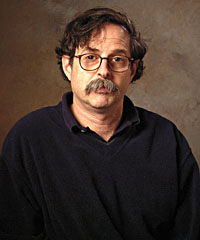 | Art Horwich |
Art Horwich, professor of genetics and pediatrics, received a 2004 Gairdner International Award for his discovery and characterization of the protein folding machinery in cells.
The five Gairdner International Award winners will receive their $30,000 (Canadian) awards Oct. 21 in Toronto. Horwich, the Eugene Higgins Professor of Cellular and Molecular Physiology and an investigator of the Howard Hughes Medical Institute, focuses his research on exploring the mechanism of action of molecular chaperones that assist protein folding in the cell.
"The 2004 Gairdner award winners honor medical scientists who have revolutionized our understanding about basic cellular functions," says Dr. John Dirks, president of the Gairdner Foundation. "The resulting human benefits in terms of alleviating disease will be enormous. Nations are now making the critical link between the kind of discovery research recognized by the Gairdner Awards, the creation and growth of entire new economic sectors, and the prospect of improved health for millions of people worldwide."
In addition to Horwich, the other award recipients are Reginald John Ellis, emeritus professor of the University of Warwick, Coventry, United Kingdom; Franz Ulrich Hartl, managing director of the Max Planck-Institute for Biochemistry, Martinsreid, Germany; Seymour Brenz, professor of biology, California Institute of Technology; and George Sachs, professor, medicine and physiology, Center for Ulcer Research and Education, University of California, Los Angeles.
Horwich and his colleagues have investigated the role of ring assemblies called chaperonins in mediating adenosine triphosphate (ATP)-dependent folding of proteins to their functional forms, as well as the mechanism of protein misfolding that results in the formation of amyloids -- fibrillar structures formed in a class of neurodegenerative diseases, including Alzheimers disease.
To understand how these and related compounds work, Horwich employs genetic analysis in vivo and biochemical analyses in vitro, in addition to crystallographic, fluorescence and nuclear magnetic resonance spectroscopy studies. He has published more than 100 articles or papers in scientific journals.
"Art's selection is incredibly well deserved," says Dr. Richard Lifton, Sterling Professor and chair of genetics. "Before his work, every biology student was taught that proteins simply fold up properly entirely on their own. Art's work has shown that all cells have an intricate machinery that plays a vital role in this process. His command of diverse technologies has taken him from the discovery of these machines to an atomic-level understanding of how they work. The scope of his work is truly breathtaking."
Elected to the National Academy of Sciences this year, Horwich has also been honored with the Society for Pediatric Research's Outstanding Young Investigator Award and the Protein Society's Hans Neurath Award. He has received a number of research awards, including the March of Dimes Basil O'Connor Starter Research Grant.
The Gairdner Foundation was established in 1957 by Toronto businessman James Gairdner. The first awards were made two years later in recognition of research in medical science and they have grown to be one of the most prestigious international awards in medical research. To date, 61 out of 269 winners have gone on to win the Nobel Prize.
T H I S
Horwich honored for work on protein folding
 W E E K ' S
W E E K ' S S T O R I E S
S T O R I E S![]()
 Volunteers to aid city groups on Yale Community Service Day
Volunteers to aid city groups on Yale Community Service Day![]()
![]()
 Garten to step down as dean of SOM
Garten to step down as dean of SOM
![]()
![]()
 Burst devoted career to expanding role of nurse-midwives
Burst devoted career to expanding role of nurse-midwives
![]()
![]()
 United Way honors Yale for its campaign
United Way honors Yale for its campaign
![]()
![]()
 Events explore medical responses to major disasters
Events explore medical responses to major disasters
![]()
![]()
 Former YSN dean to be named a state 'treasure'
Former YSN dean to be named a state 'treasure'
![]()
![]()
 Two-day symposium at the School of Nursing will celebrate . . .
Two-day symposium at the School of Nursing will celebrate . . .
![]()
![]()
 Study: Light therapy as effective as anti-depressants for pregnant women
Study: Light therapy as effective as anti-depressants for pregnant women
![]()
![]()
 Strong link found between teen smoking and suicide attempts
Strong link found between teen smoking and suicide attempts
![]()
![]()
 Hatching emu eggs and a friendly condor among Peabody attractions
Hatching emu eggs and a friendly condor among Peabody attractions
![]()
![]()
 Diverse visual images highlight new 'Treasure Maps' exhibit
Diverse visual images highlight new 'Treasure Maps' exhibit
![]()
![]()
 Yale Rep's upcoming season to feature a mix of old and new
Yale Rep's upcoming season to feature a mix of old and new
![]()
![]()
 Polish government honors Yale curator's work
Polish government honors Yale curator's work
![]()
![]()
 F&ES to host workshop on environmental change
F&ES to host workshop on environmental change
![]()
![]()
 Eli Pie
Eli Pie
![]()
Bulletin Home |
| Visiting on Campus
Visiting on Campus |
| Calendar of Events
Calendar of Events |
| In the News
In the News![]()
Bulletin Board |
| Classified Ads
Classified Ads |
| Search Archives
Search Archives |
| Deadlines
Deadlines![]()
Bulletin Staff |
| Public Affairs
Public Affairs |
| News Releases
News Releases |
| E-Mail Us
E-Mail Us |
| Yale Home
Yale Home